French actor, director and mime artist Jean-Louis Barrault (1910-1994) was a giant of both the classical and avant-garde theater in France. He also acted in nearly 50 films, associating with such great European film directors as Abel Gance, Georg Wilhelm Pabst, Max Ophüls and Jean Renoir. His slender frame, gentle posture and sensitive face belied a great power and those same talents were utilized magnificently, now and then, on film. His pantomime training with Étienne Decroux served him well when he portrayed the 19th-century mime Baptiste Debureau in the classic of the French cinema, Les Enfants du Paradis/Children of Paradise (Marcel Carné, 1945).
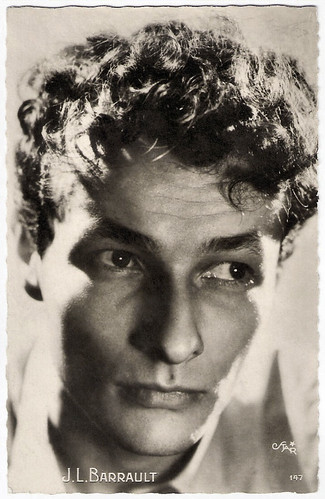
French postcard by Editions O.P., Paris, no. 147. Photo: Star.
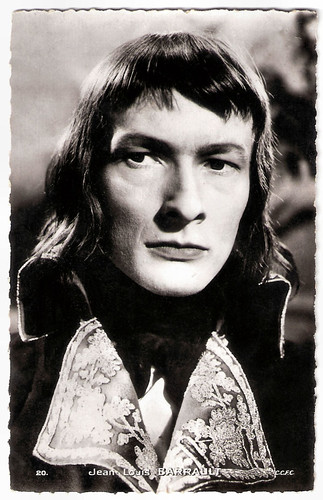
French postcard by Edit. Chantal, Rueil, no. 20. Photo: C.C.F.C. Publicity still for Le Destin fabuleux de Désirée Clary/Mlle. Desiree (Sacha Guitry, 1942) with Barrault as Napoléon Bonaparte.
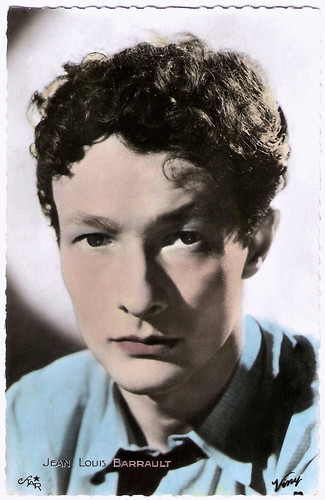
French photo card by Viny, no. 132. Photo: Star.
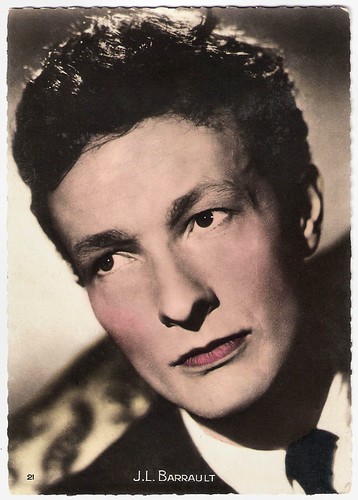
French postcard by Edition P.I., Paris, no. 21.
Jean-Louis Barrault was born in Le Vésinet near Paris in 1910. He was the son of a pharmacist. At the age of six he decided that his career would be in the theatre.
From an ordinary working-class state school, he was admitted to the College Chaptel where he took his baccalaureate and taught for a year. His studies were principally in mathematics, philosophy and art, and although a scholarship pupil with no spending money he lost no opportunity to attend the theatre or to act.
At 20, he made his official film debut in the little known Vagabonds imaginaires/Imaginary Vagabonds (1930), billed as J.L. Barrault. A year later followed his stage debut as a servant in Charles Dullin's production of Volpone at the Théâtre de l'Atelier.
He studied drama with Charles Dullin, one of the greatest actors and drama teachers of his time. In his troop he acted from 1933 to 1935, while he supported himself as a bookkeeper and flower salesman during those lean years.
At the age of 25, Barrault met and studied with the mime Étienne Decroux. Years later, Decroux would play the father of Barrault's character Baptiste in Les Enfants du Paradis/Children of Paradise (Marcel Carné, 1945).
Barrault started to work with his own ensemble. His first independent production, an adaptation of William Faulkner’s novel As I Lay Dying (1935), was a mime play. His other early productions included Miguel de Cervantes’s Numancia (1937) and Faim (1939), based on the novel Hunger by Knut Hamsun.
He also played supporting roles in such films as Les beaux jours/The Beautiful Days (Marc Allégret, 1935) starring Simone Simon, Un grand amour de Beethoven/Beethoven (Abel Gance, 1936) featuring Harry Baur, and Jenny (Marcel Carné, 1936) with Françoise Rosay.
Then he made quite an impact in the comedy Drôle de drame/Bizarre, bizarre (Marcel Carné, 1937) starring Louis Jouvet, and the classic romantic film Mirages (Alexandre Ryder, 1937) opposite the enigmatic Arletty.
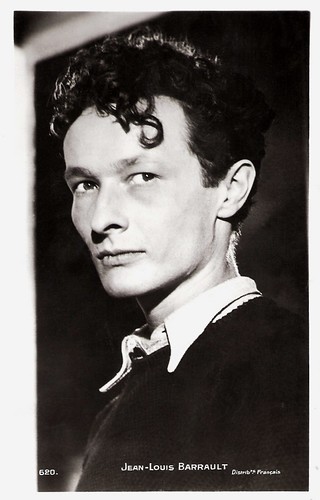
French postcard by Edition Chantal, Paris, no. 620. Photo: Distrib.rs Français.
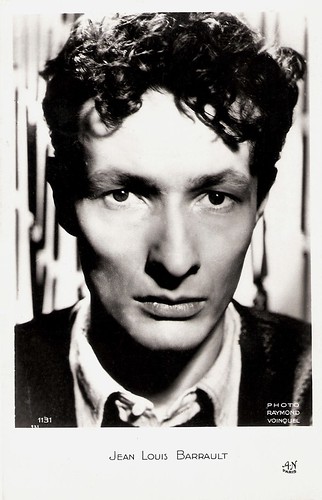
French postcard by A. Noyer (A.N.), Paris, no. 1131. Photo: Raymond Voinquel.
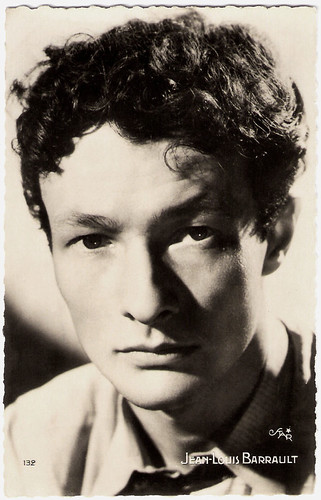
French postcard by Editions P.I., Paris, no. 132. Photo: Star.
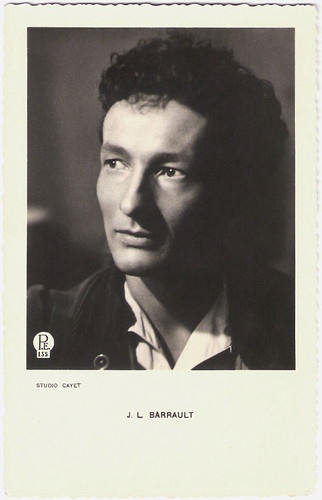
Belgian postcard by Photo Edition (P.E.), no. 155. Photo: Studio Cayet.
In 1940, Jean-Louis Barrault joined the Comédie-Française at the instigation of Jacques Copeau and he worked both as actor and director for France's national theatre company. Till 1946 he directed productions like Paul Claudel's Le Soulier de satin (The Satin Slipper) and Jean Racine's Phèdre, two plays that made his reputation. His dedication to both avant-garde and classical plays helped to revive the French theatre after World War II, while presenting world premières of works by such playwrights as Samuel Beckett, Eugène Ionesco and Jean Genet.
In 1940, he married Madeleine Renaud, who was one of the stars of the Comédie-Française since 1928. In 1936 Barrault had met the actress, who was a decade his senior. In 1947, they founded their own company at the Théâtre Marigny under the name Compagnie M. Renaud–J.L. Barrault. They opened with Hamlet in a translation by André Gide, Later they founded other theatres and toured extensively, including in South America.
In 1952, Barrault and Renard made daunting Broadway débuts touring in repertory with Les Fausses Confidences (False Confessions) by Pierre Marivaux, Barrault's own adaptation of The Trial by Kafka, Amphitryon, and other productions. The combination of French and foreign classics with modern plays became the hallmark of the company’s great success. In 1957, they returned with Paul Claudel's Christopher Columbus, Volpone, The Misanthrope, Intermezzo, and others. That year Barrault received a Special Tony Award for his work.
In his 1994 obituary of Barrault in the British newspaper The Independent, John Calder writes: "He improvised his own dramatic versions of great French and European literature and made stunning spectacles of them, and he was a practical man of the theatre who knew how to produce dramas that were didactic and at the same time exciting. He perfectly embodied in his productions (Antonin) Artaud's belief that the theatre had no value if it did not change the lives and attitudes of those who came to it; he was an intellectual who never lost the common touch, who gave his whole life to his profession and through it became a great teacher and exponent of the ideas of others that he developed into his own conception of 'total theatre'. Barrault built a team of loyal and devoted professionals around him, not only actors, but administrators and creative talents as well".
Barrault's greatest film triumph was his portrayal of Baptiste in Les enfants du paradis/Children of Paradise (Marcel Carné, 1945). The story was based on the life of the 19th century mime-actor Jean-Gaspard Deburau (Baptiste Debureau), and Barrault originally suggested the subject to director Marcel Carné and author Jacques Prévert. The phenomenal success of this film singlehandedly revived public interest in the art of pantomime and subsequently influenced the popularity of legendary mime Marcel Marceau. On the set of Les enfants du paradis, Barrault hid French Resistance members.
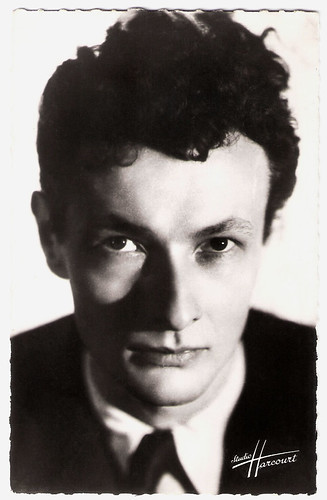
French postcard by O.P., Paris, no. 14. Photo: Studio Harcourt.
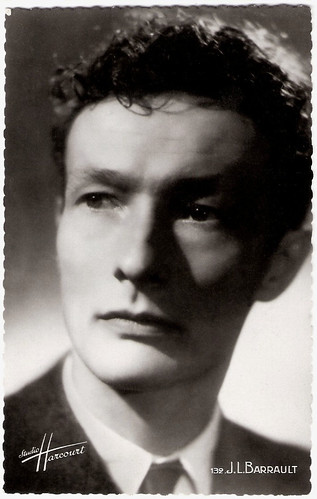
French photo card by SERP, Paris, no. 132. Photo: Studio Harcourt.
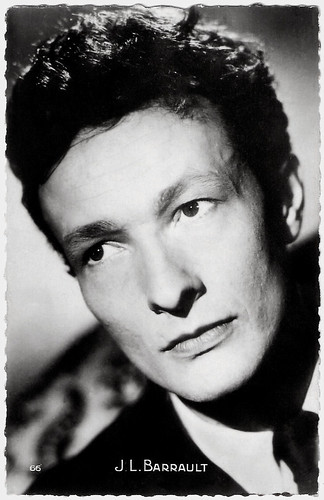
French postcard by Editions P.I., Paris, no. 66.
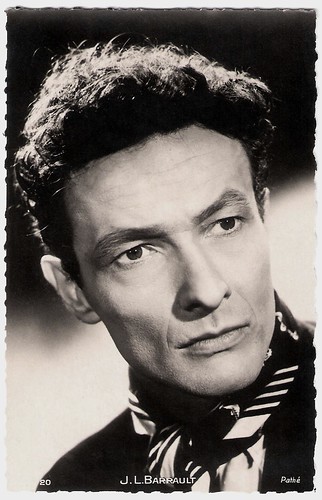
French postcard by Editions E.C., Paris, no. 20. Photo: Pathé.
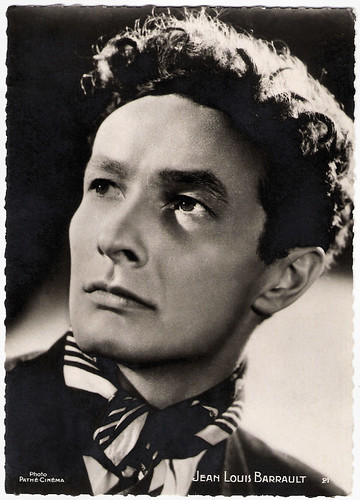
French postcard by P.I., Paris, no. 21. Photo: Pathé-Cinéma.
After the war, Jean-Louis Barrault also appeared in many well-known films. A highlight was the Oscar nominated La ronde/Roundabout (1950), Max Ophüls' ode to love in the Vienna of 1900 with Anton Walbrook as the narrator.
Interesting is also the TV film Le testament du Docteur Cordelier/Experiment in Evil (Jean Renoir, 1959), in which Barrault played Dr. Jekyll and Mr. Hyde using no make-up or camera tricks for his transformation. He also appeared as a priest in the Oscar winning war epic The Longest Day (1962, Ken Annakin, Andrew Marton, Bernhard Wicki).
In 1959, Barrault was offered the Theatre de l'Odeon by the government: this was the little-used left-bank second theatre of the Comédie-Française, and renamed the Theatre de France it became the most prestigious playhouse in the country. He now widened the repertory to include the new drama that had emerged from Samuel Beckett, and Eugene Ionesco. He directed and played the lead in Ionesco's Rhinoceros, while Madeleine Renaud made one of the most telling interpretations of her career in Beckett's O les Beaux Jours (Happy Days), a role she continued to play until over 90.
In 1968 it was announced that Barrault had been ordered to leave as manager of the Theatre de France. The death blow was administered in a letter from his old friend André Malraux, General de Gaulle's Culture Minister, who had initially asked Barrault to preside the Theatre de France as its director. The cause of Barrault's dismissal was his role in the May riots there.
During the demonstrations, anarchist students from the Sorbonne 'liberated' the Odéon Theatre and turned it into a discussion hall. They also destroyed 50% of the sets, ripped up red velvet seats and urinated on costumes. Barrault wept when he saw the damage, but government officials believed that he tacitly allowed the rebels to take over. Barrault also took to the stage to proclaim his sympathy with student goals and to denounce France's 'bourgeois culture.' His removal set off a chorus of protests by French stage figures and critics.
In later years Barrault served twice as director of the Theatre des Nations and in 1974-1981 he was the director of the Theatre d'Orsay. A year later he appeared in the film La Nuit des Varennes/That Night in Varennes (Ettore Scola, 1982) in which he was one of the passengers in a stagecoach who find themselves caught up in the events of the French Revolution in 1791.
His last film performance was in the romantic drama La lumière du lac/The Light of the Lake (Francesca Comencini, 1988) starring Nicole Garcia.
In 1994 Jean-Louis Barrault died in his sleep, apparently of a heart attack in his house in Paris, at the age of 83. The beloved actor was the uncle of actress Marie-Christine Barrault. His wife Madeleine died in September of that same year at age 94.
Among Barrault’s publications are Réflexions sur le théâtre (Reflections on the Theatre, 1949), Nouvelles Réflexions sur le théâtre (The Theatre of Jean-Louis Barrault, 1959), and Souvenirs pour demain (Memories for Tomorrow, 1972). Barrault was named an officer of the Legion of Honour.
Trailer for Les Enfants du Paradis/Children of Paradise (1945). Source: Pathé (YouTube).
Compilation of La ronde/Roundabout (1950). Source: illmatikss (YouTube). Music: Duke Ellington & John Coltrane: In a sentimental mood / My little brown book.
Trailer The Longest Day (1962). Source: Danios 12345 (YouTube).
French trailer La Nuit des Varennes/That Night in Varennes (1982). Source: Gaumont (YouTube).
Sources: John Calder (The Independent), Hal Erickson (AllMovie), Alan Riding (New York Times), Gary Brumburgh (IMDb), Encyclopaedia Britannica, IMDb and Wikipedia.

French postcard by Editions O.P., Paris, no. 147. Photo: Star.

French postcard by Edit. Chantal, Rueil, no. 20. Photo: C.C.F.C. Publicity still for Le Destin fabuleux de Désirée Clary/Mlle. Desiree (Sacha Guitry, 1942) with Barrault as Napoléon Bonaparte.

French photo card by Viny, no. 132. Photo: Star.

French postcard by Edition P.I., Paris, no. 21.
Comédie-Française
Jean-Louis Barrault was born in Le Vésinet near Paris in 1910. He was the son of a pharmacist. At the age of six he decided that his career would be in the theatre.
From an ordinary working-class state school, he was admitted to the College Chaptel where he took his baccalaureate and taught for a year. His studies were principally in mathematics, philosophy and art, and although a scholarship pupil with no spending money he lost no opportunity to attend the theatre or to act.
At 20, he made his official film debut in the little known Vagabonds imaginaires/Imaginary Vagabonds (1930), billed as J.L. Barrault. A year later followed his stage debut as a servant in Charles Dullin's production of Volpone at the Théâtre de l'Atelier.
He studied drama with Charles Dullin, one of the greatest actors and drama teachers of his time. In his troop he acted from 1933 to 1935, while he supported himself as a bookkeeper and flower salesman during those lean years.
At the age of 25, Barrault met and studied with the mime Étienne Decroux. Years later, Decroux would play the father of Barrault's character Baptiste in Les Enfants du Paradis/Children of Paradise (Marcel Carné, 1945).
Barrault started to work with his own ensemble. His first independent production, an adaptation of William Faulkner’s novel As I Lay Dying (1935), was a mime play. His other early productions included Miguel de Cervantes’s Numancia (1937) and Faim (1939), based on the novel Hunger by Knut Hamsun.
He also played supporting roles in such films as Les beaux jours/The Beautiful Days (Marc Allégret, 1935) starring Simone Simon, Un grand amour de Beethoven/Beethoven (Abel Gance, 1936) featuring Harry Baur, and Jenny (Marcel Carné, 1936) with Françoise Rosay.
Then he made quite an impact in the comedy Drôle de drame/Bizarre, bizarre (Marcel Carné, 1937) starring Louis Jouvet, and the classic romantic film Mirages (Alexandre Ryder, 1937) opposite the enigmatic Arletty.

French postcard by Edition Chantal, Paris, no. 620. Photo: Distrib.rs Français.

French postcard by A. Noyer (A.N.), Paris, no. 1131. Photo: Raymond Voinquel.

French postcard by Editions P.I., Paris, no. 132. Photo: Star.

Belgian postcard by Photo Edition (P.E.), no. 155. Photo: Studio Cayet.
Children of Paradise
In 1940, Jean-Louis Barrault joined the Comédie-Française at the instigation of Jacques Copeau and he worked both as actor and director for France's national theatre company. Till 1946 he directed productions like Paul Claudel's Le Soulier de satin (The Satin Slipper) and Jean Racine's Phèdre, two plays that made his reputation. His dedication to both avant-garde and classical plays helped to revive the French theatre after World War II, while presenting world premières of works by such playwrights as Samuel Beckett, Eugène Ionesco and Jean Genet.
In 1940, he married Madeleine Renaud, who was one of the stars of the Comédie-Française since 1928. In 1936 Barrault had met the actress, who was a decade his senior. In 1947, they founded their own company at the Théâtre Marigny under the name Compagnie M. Renaud–J.L. Barrault. They opened with Hamlet in a translation by André Gide, Later they founded other theatres and toured extensively, including in South America.
In 1952, Barrault and Renard made daunting Broadway débuts touring in repertory with Les Fausses Confidences (False Confessions) by Pierre Marivaux, Barrault's own adaptation of The Trial by Kafka, Amphitryon, and other productions. The combination of French and foreign classics with modern plays became the hallmark of the company’s great success. In 1957, they returned with Paul Claudel's Christopher Columbus, Volpone, The Misanthrope, Intermezzo, and others. That year Barrault received a Special Tony Award for his work.
In his 1994 obituary of Barrault in the British newspaper The Independent, John Calder writes: "He improvised his own dramatic versions of great French and European literature and made stunning spectacles of them, and he was a practical man of the theatre who knew how to produce dramas that were didactic and at the same time exciting. He perfectly embodied in his productions (Antonin) Artaud's belief that the theatre had no value if it did not change the lives and attitudes of those who came to it; he was an intellectual who never lost the common touch, who gave his whole life to his profession and through it became a great teacher and exponent of the ideas of others that he developed into his own conception of 'total theatre'. Barrault built a team of loyal and devoted professionals around him, not only actors, but administrators and creative talents as well".
Barrault's greatest film triumph was his portrayal of Baptiste in Les enfants du paradis/Children of Paradise (Marcel Carné, 1945). The story was based on the life of the 19th century mime-actor Jean-Gaspard Deburau (Baptiste Debureau), and Barrault originally suggested the subject to director Marcel Carné and author Jacques Prévert. The phenomenal success of this film singlehandedly revived public interest in the art of pantomime and subsequently influenced the popularity of legendary mime Marcel Marceau. On the set of Les enfants du paradis, Barrault hid French Resistance members.

French postcard by O.P., Paris, no. 14. Photo: Studio Harcourt.

French photo card by SERP, Paris, no. 132. Photo: Studio Harcourt.

French postcard by Editions P.I., Paris, no. 66.

French postcard by Editions E.C., Paris, no. 20. Photo: Pathé.

French postcard by P.I., Paris, no. 21. Photo: Pathé-Cinéma.
Dr. Jekyll and Mr. Hyde
After the war, Jean-Louis Barrault also appeared in many well-known films. A highlight was the Oscar nominated La ronde/Roundabout (1950), Max Ophüls' ode to love in the Vienna of 1900 with Anton Walbrook as the narrator.
Interesting is also the TV film Le testament du Docteur Cordelier/Experiment in Evil (Jean Renoir, 1959), in which Barrault played Dr. Jekyll and Mr. Hyde using no make-up or camera tricks for his transformation. He also appeared as a priest in the Oscar winning war epic The Longest Day (1962, Ken Annakin, Andrew Marton, Bernhard Wicki).
In 1959, Barrault was offered the Theatre de l'Odeon by the government: this was the little-used left-bank second theatre of the Comédie-Française, and renamed the Theatre de France it became the most prestigious playhouse in the country. He now widened the repertory to include the new drama that had emerged from Samuel Beckett, and Eugene Ionesco. He directed and played the lead in Ionesco's Rhinoceros, while Madeleine Renaud made one of the most telling interpretations of her career in Beckett's O les Beaux Jours (Happy Days), a role she continued to play until over 90.
In 1968 it was announced that Barrault had been ordered to leave as manager of the Theatre de France. The death blow was administered in a letter from his old friend André Malraux, General de Gaulle's Culture Minister, who had initially asked Barrault to preside the Theatre de France as its director. The cause of Barrault's dismissal was his role in the May riots there.
During the demonstrations, anarchist students from the Sorbonne 'liberated' the Odéon Theatre and turned it into a discussion hall. They also destroyed 50% of the sets, ripped up red velvet seats and urinated on costumes. Barrault wept when he saw the damage, but government officials believed that he tacitly allowed the rebels to take over. Barrault also took to the stage to proclaim his sympathy with student goals and to denounce France's 'bourgeois culture.' His removal set off a chorus of protests by French stage figures and critics.
In later years Barrault served twice as director of the Theatre des Nations and in 1974-1981 he was the director of the Theatre d'Orsay. A year later he appeared in the film La Nuit des Varennes/That Night in Varennes (Ettore Scola, 1982) in which he was one of the passengers in a stagecoach who find themselves caught up in the events of the French Revolution in 1791.
His last film performance was in the romantic drama La lumière du lac/The Light of the Lake (Francesca Comencini, 1988) starring Nicole Garcia.
In 1994 Jean-Louis Barrault died in his sleep, apparently of a heart attack in his house in Paris, at the age of 83. The beloved actor was the uncle of actress Marie-Christine Barrault. His wife Madeleine died in September of that same year at age 94.
Among Barrault’s publications are Réflexions sur le théâtre (Reflections on the Theatre, 1949), Nouvelles Réflexions sur le théâtre (The Theatre of Jean-Louis Barrault, 1959), and Souvenirs pour demain (Memories for Tomorrow, 1972). Barrault was named an officer of the Legion of Honour.
Trailer for Les Enfants du Paradis/Children of Paradise (1945). Source: Pathé (YouTube).
Compilation of La ronde/Roundabout (1950). Source: illmatikss (YouTube). Music: Duke Ellington & John Coltrane: In a sentimental mood / My little brown book.
Trailer The Longest Day (1962). Source: Danios 12345 (YouTube).
French trailer La Nuit des Varennes/That Night in Varennes (1982). Source: Gaumont (YouTube).
Sources: John Calder (The Independent), Hal Erickson (AllMovie), Alan Riding (New York Times), Gary Brumburgh (IMDb), Encyclopaedia Britannica, IMDb and Wikipedia.
4 comments:
The first photo reminds me of American actor Dean Stockwell, but the second - not so much.
Another star I'd never know about without stopping over here!
What a wonderful looking man. I love his face. Thank you for sharing this bit of history.
Happy PFF!
Howdy
Happy PFF it is so wonderful to come by and read your post.
This was another fantastic post filled with all new information to enjoy.
Thank you so very much for making
Pff so wonderful .
Have a great weekend.
Happy Trails
Post a Comment